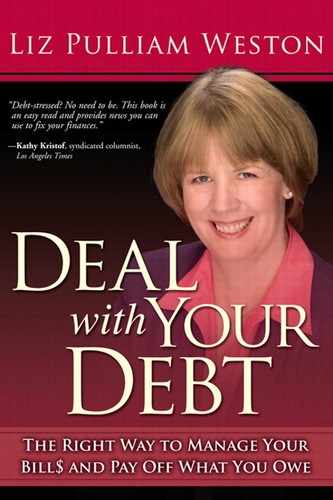Debt Isn't the Enemy
People with serious debt problems may try to do too much too fast and then give up in despair. Or they might pay off the wrong kinds of debt, stranding themselves with too little flexibility to survive a financial crisis. In their zeal to pay off debt, some people neglect other important goals, such as saving for retirement, a home, or college, and ultimately end up hundreds of thousands of dollars poorer than they might have been.
Worse yet, they might be encouraged to continue fighting a battle they simply can't win.
If you're having debt problems, you need information, advice, and a clear-eyed assessment of your financial situation so that you can make the best choices for yourself and your family. Short-term fixes and inspirational slogans might help, but you shouldn't choose them at the expense of your long-term economic health.
Even if you're not in a crisis, it will help you enormously to view debt for what it is: a financial tool that's virtually essential for building wealth, reaching your goals, and living happily.
Think about it. Few of us could afford a home without taking on a mortgage, and many couldn't swing college educations without the help of a few loans. Consider the payoffs:
The massive growth of the mortgage industry has helped boost the U.S. homeownership rate to nearly 70%, compared to less than 44% in 1940. That, in turn, has helped millions of families get richer: The median net worth for homeowners in a recent Federal Reserve study was $171,700, compared to just $4,800 for renters.
Student loans helped more than 50 million people attend college, an investment in their futures that pays off in higher incomes and greater productivity. One study found that college graduates usually recouped the cost of their education, including the earnings they missed while attending school, by the time they were in their early 30s.
Debt also can help you survive a job loss, buy a safe car for your growing family, or even start a business—and sometimes all three.
I was raised by a mother who hated debt. She taught me to pay off my credit cards in full every month (thank you, Mom!) and to live within my means. I inherited her distrust of lenders to the point that, after my sophomore year at a small Northwest college, I turned down Stanford University's offer of admission as a transfer student because its financial aid package consisted entirely of loans rather than scholarships or grants.
Imagine my surprise, then, the first time I heard a financial planner tell a client that debt wasn't necessarily bad.
The advice was part of a “money makeover” feature I was writing for my newspaper. The planner suggested our makeover subject invest in her retirement plan rather than rushing to pay off her low-rate student loan debt. The idea that debt repayment needn't always be a top priority was news to me.
Later, I would consult with planners who routinely suggested that their clients open home equity lines of credit to supplement their emergency funds. I had always thought that home equity was sacrosanct, but these planners—smart, objective folks at the top of their field—pointed out it could also be a tool.
I'm glad I got that education because a few years ago my husband and I were able to put it to use.
My husband, who works in the animation industry, was laid off during a massive corporate downsizing that put 4,000 artists out of work. It was several months before he found another full-time job.
Just when our emergency fund was hitting a low ebb, Microsoft approached me about leaving my job at the Los Angeles Times to write for MSN. The money was great, and I could work from home—but because I would be forming my own corporation and MSN would be a client, there would be a three-month gap before I got my first check.
Oh, yes, and right after I decided to take the leap, I discovered I was pregnant.
Now, many in the anti-debt crowd would have told me not to leave my job—that it was too great a risk. I took it, though, and we lived on credit cards until those first checks started coming in. After our daughter was born, we used our home equity line to purchase a safer car.
Just a few years later, our income has soared. The credit cards have long since been paid off, and the car borrowing will be retired soon. Debt gave us the flexibility to seize an opportunity that might otherwise have passed us by.
